10 books about Short, David
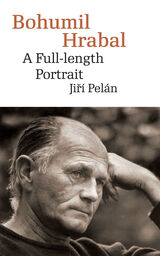
Bohumil Hrabal
A Full-Length Portrait
Jirí Pelán
Karolinum Press, 2019
Described by Parul Sehgal in the New York Times Book Review as “one of the great prose stylists of the twentieth century; the scourge of state censors; the gregarious bar hound and lover of gossip, beer, cats, and women (in roughly that order),” Bohumil Hrabal is one of the most important, most translated, and most idiosyncratic Czech authors. In Bohumil Hrabal: A Full-Length Portrait, Jiří Pelán makes the case that this praise is far too narrow. A respected scholar of French and Italian literature, Pelán approaches Hrabal as a comparatist, expertly situating him within the context of European and world literature as he explores the entirety of Hrabal’s oeuvre and its development over sixty years. Concise, clear, and as compulsively readable as the works of Hrabal himself, Bohumil Hrabal was universally praised by critics in its original Czech edition as one of best works of Hrabal criticism. Here it is beautifully rendered into English for the first time by David Short, a celebrated translator of Hrabal’s works. Also featuring a fascinating selection of black-and-white images from Hrabal’s life, Bohumil Hrabal is essential reading for anyone interested in this crucial Czech author.
[more]
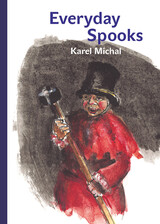
Everyday Spooks
Karel Michal
Karolinum Press, 2008
Prague-born Karel Michal (1932–84) lived a significant part of his adult life under Czechoslovakia’s oppressive communist regime. Prevented from studying at the university as a young man, he fruitlessly cycled through a number of professions before finally turning to writing in the early 1960s. Michal’s works—which include detective fiction, historical novels, short stories, and screenplays—offer a Kafkaesque perspective on the mechanism of the absurd and argue for substantial reinterpretation of the concept of ordinary life under a totalitarian regime.
With Everyday Spooks, Michal presents an unforgettable assortment of fantastic creatures that inhabit his strange vision of everyday reality in ’50s and ’60s communist Czechoslovakia. Translated from the Czech by David Short and complemented with suitably eerie illustrations by Dagmar Hamsíková, this collection of seven short stories describes bizarre encounters where the past melts into the present, ordinary people meet comic and anxious figures and interact with ghosts, and mundane speech drifts repeatedly into absurdity.
[more]
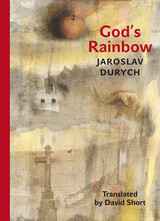
God's Rainbow
Jaroslav Durych
Karolinum Press, 2016
This is a book about collective guilt, individual fate, and repentance, a tale that explores how we can come to be responsible for crimes we neither directly commit nor have the power to prevent. Set in the Czechoslovakian borderland shortly after WWII amid the sometimes violent expulsion of the region’s German population, Jaroslav Durych’s poetic, deeply symbolic novel is a literary touchstone for coming to terms with the Czech Republic’s difficult and taboo past of state-sanctioned violence.
A leading Catholic intellectual of the early twentieth century, Durych became a literary and political throwback to the prewar Czechoslovak Republic and faced censorship under the Stalinist regime of the 1950s. As such, he was a man not unfamiliar with the ramifications of a changing society in which the minority becomes the rule-making political authority, only to end up condemned as criminals. Though Durych finished writing God’s Rainbow in 1955, he could not have hoped to see it published in his lifetime. Released in a still-censored form in 1969, God’s Rainbow is available here in full for the first time in English.
A leading Catholic intellectual of the early twentieth century, Durych became a literary and political throwback to the prewar Czechoslovak Republic and faced censorship under the Stalinist regime of the 1950s. As such, he was a man not unfamiliar with the ramifications of a changing society in which the minority becomes the rule-making political authority, only to end up condemned as criminals. Though Durych finished writing God’s Rainbow in 1955, he could not have hoped to see it published in his lifetime. Released in a still-censored form in 1969, God’s Rainbow is available here in full for the first time in English.
[more]

A History of Light
Jan Nemec
Seagull Books, 2024
A unique blend of fiction and biography that explores the fascinating life of early-twentieth-century Czech photographer František Drtikol.
Have you ever wondered what a story written by a beam of light would be like? The story would be ordinary, but the course of events extraordinary. Its hero would be a photographer, a guardian of light. And, naturally, the tale would be full of shadow.
A History of Light delves into the fascinating life of František Drtikol (1883–1961), an important figure in early-twentieth-century photography who is all but forgotten in contemporary times. A dandy from a small mining town, a world-famous photographer whose business went bankrupt, a master of the nude who never had much luck with women, a mystic and a Buddhist who believed in communism—a man whose numerous contradictions were evident externally and synthesized internally.
A unique blend of fiction and biography, this novel vividly portrays Drtikol’s life, tracing the diverse stages of his career and offering detailed, almost encyclopedic insights into the times and places pivotal to his journey. Acclaimed Czech author Jan Němec narrates the story in the uncommon second-person singular, speaking directly to his subject. Fresco-like, this novel is an artistic and spiritual Bildungsroman that covers over half a century, bringing to life the silver mines of Príbram, Jugendstil Munich, and the Bohemianism of the First Czechoslovak Republic. Drtikol’s role as a photographer is set against the turbulent history of Central Europe through the two World Wars, and the events of those five decades form a riveting backdrop for an exploration of the artist’s work.
Have you ever wondered what a story written by a beam of light would be like? The story would be ordinary, but the course of events extraordinary. Its hero would be a photographer, a guardian of light. And, naturally, the tale would be full of shadow.
A History of Light delves into the fascinating life of František Drtikol (1883–1961), an important figure in early-twentieth-century photography who is all but forgotten in contemporary times. A dandy from a small mining town, a world-famous photographer whose business went bankrupt, a master of the nude who never had much luck with women, a mystic and a Buddhist who believed in communism—a man whose numerous contradictions were evident externally and synthesized internally.
A unique blend of fiction and biography, this novel vividly portrays Drtikol’s life, tracing the diverse stages of his career and offering detailed, almost encyclopedic insights into the times and places pivotal to his journey. Acclaimed Czech author Jan Němec narrates the story in the uncommon second-person singular, speaking directly to his subject. Fresco-like, this novel is an artistic and spiritual Bildungsroman that covers over half a century, bringing to life the silver mines of Príbram, Jugendstil Munich, and the Bohemianism of the First Czechoslovak Republic. Drtikol’s role as a photographer is set against the turbulent history of Central Europe through the two World Wars, and the events of those five decades form a riveting backdrop for an exploration of the artist’s work.
[more]
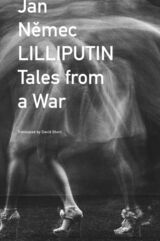
Lilliputin
Tales from a War
Jan Nemec
Seagull Books, 2023
Written in the first four months of the war in Ukraine, fuelled by anger towards mindless violence, Nemec’s stories tackle the present moment and confront what really matters at times of abundant destruction.
A Czech man in Ukraine in search of his alter ego. A gang of homeless kids driven from a cellar by tenants using it as a shelter from the war. A German couple who ‘rented a womb’ in Ukraine, whose child is now stuck in Kyiv. A teenager partnered with a Valkyrie for the distribution of lavash in besieged Mariupol delays his flight until it is too late. A Russian academic mounting a protest in the center of Moscow dressed in a costume from Swan Lake. They may not be soldiers at the front, but for the characters in these stories, life will never again be as it was before the Russian invasion of Ukraine. In this collection of short stories—two set in Ukraine, two in the West, and one in Russia—Czech author Jan Nemec has produced a work of remarkable immediacy.
A Czech man in Ukraine in search of his alter ego. A gang of homeless kids driven from a cellar by tenants using it as a shelter from the war. A German couple who ‘rented a womb’ in Ukraine, whose child is now stuck in Kyiv. A teenager partnered with a Valkyrie for the distribution of lavash in besieged Mariupol delays his flight until it is too late. A Russian academic mounting a protest in the center of Moscow dressed in a costume from Swan Lake. They may not be soldiers at the front, but for the characters in these stories, life will never again be as it was before the Russian invasion of Ukraine. In this collection of short stories—two set in Ukraine, two in the West, and one in Russia—Czech author Jan Nemec has produced a work of remarkable immediacy.
[more]
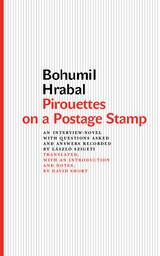
Pirouettes on a Postage Stamp
An Interview-Novel with Questions Asked and Answers Recorded by László Szigeti
Bohumil Hrabal
Karolinum Press, 2008
Novelist Bohumil Hrabal (1914–97) was born in Brno, Czechoslovakia and spent decades working at a variety of laboring jobs before turning to writing in his late forties. From that point, he quickly made his mark on the Czech literary scene; by his death he was ranked with Jaroslav Hašek, Karel Capek, and Milan Kundera as among the nation’s greatest twentieth-century writers. Known for writing about political questions with humor and vivid expressiveness, Hrabal also was given to experimentation—his early novel Dancing Lessons for the Advanced in Age, for example, consists of a single extended sentence.
Pirouettes on a Postage Stamp carried Hrabal’s experimentation to the field of autobiography. On its surface a verbatim record of an oral interview conducted by Hungarian journalist László Szigeti, the book confuses and confounds with false starts, digressions, and philosophical asides. Yet despite all the games and distractions, Hrabal’s personality shines through, compelling and unforgettable, making Pirouette on a Postage Stamp an unexpected treat for any lover of Czech literature.
Pirouettes on a Postage Stamp carried Hrabal’s experimentation to the field of autobiography. On its surface a verbatim record of an oral interview conducted by Hungarian journalist László Szigeti, the book confuses and confounds with false starts, digressions, and philosophical asides. Yet despite all the games and distractions, Hrabal’s personality shines through, compelling and unforgettable, making Pirouette on a Postage Stamp an unexpected treat for any lover of Czech literature.
[more]
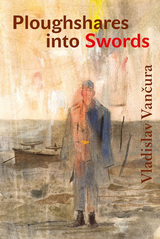
Ploughshares into Swords
Vladislav Vancura
Karolinum Press, 2021
The first English-language translation of a classic Czech antiwar novel written in the wake of WWI.
Originally published in 1925, Ploughshares into Swords is an expressionist antiwar novel in which Vladislav Vančura tells the story of the denizens of the Ouhrov estate in language as baroque as the manor that ties them all together. The fragmented narrative introduces the reader to such characters as Baron Danowitz, his sons, his French concubine, the farmhand František Hora, and the mentally disabled murderer Řeka in the autumn of 1913, before revealing their fates during World War I. Ranging from the peaceful farmlands of Bohemia to the battlefields of Galicia, taking in the pubs of Budapest and the hospitals of Krakow, the novel constitutes an unsentimental and naturalistic approach to the war that created Czechoslovakia. Ploughshares into Swords is a stunning novel by one of Czech literature’s most important writers. This modernist masterpiece, reminiscent of the work of Isaac Babel and William Faulkner, is now available in English for the very first time.
Originally published in 1925, Ploughshares into Swords is an expressionist antiwar novel in which Vladislav Vančura tells the story of the denizens of the Ouhrov estate in language as baroque as the manor that ties them all together. The fragmented narrative introduces the reader to such characters as Baron Danowitz, his sons, his French concubine, the farmhand František Hora, and the mentally disabled murderer Řeka in the autumn of 1913, before revealing their fates during World War I. Ranging from the peaceful farmlands of Bohemia to the battlefields of Galicia, taking in the pubs of Budapest and the hospitals of Krakow, the novel constitutes an unsentimental and naturalistic approach to the war that created Czechoslovakia. Ploughshares into Swords is a stunning novel by one of Czech literature’s most important writers. This modernist masterpiece, reminiscent of the work of Isaac Babel and William Faulkner, is now available in English for the very first time.
[more]
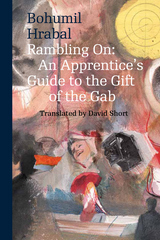
Rambling On
An Apprentice's Guide to the Gift of the Gab
Bohumil Hrabal
Karolinum Press, 2016
Novelist Bohumil Hrabal was born in Brno, Czechoslovakia, and he spent decades working at a variety of laboring jobs before turning to writing in his late forties. From that point, he quickly made his mark on the Czech literary scene; by the time of his death he was ranked with Jaroslav Hašek, Karel Čapek, and Milan Kundera as among the nation’s greatest twentieth-century writers. Hrabal’s fiction blends tragedy with humor and explores the anguish of intellectuals and ordinary people alike from a slightly surreal perspective. His work ranges from novels and poems to film scripts and essays. Rambling On is a collection of stories set in Hrabal’s Kersko. Several of the stories were written before the 1968 Soviet invasion of Prague but had to be reworked when they were rejected by Communist censorship during the 1970s. This edition features the original, uncensored versions of those stories.
[more]
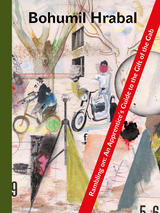
Rambling On
An Apprentice’s Guide to the Gift of the Gab
Bohumil Hrabal
Karolinum Press, 2014
Novelist Bohumil Hrabal was born in Brno, Czechoslovakia, and he spent decades working at a variety of laboring jobs before turning to writing in his late forties. From that point, he quickly made his mark on the Czech literary scene; by the time of his death he was ranked with Jaroslav Hašek, Karel Čapek, and Milan Kundera as among the nation’s greatest twentieth-century writers. Hrabal’s fiction blends tragedy with humor and explores the anguish of intellectuals and ordinary people alike from a slightly surreal perspective. His work ranges from novels and poems to film scripts and essays. Rambling On is a collection of stories set in Hrabal’s Kersko. Several of the stories were written before the 1968 Soviet invasion of Prague but had to be reworked when they were rejected by Communist censorship during the 1970s. This edition features the original, uncensored versions of those stories.
[more]
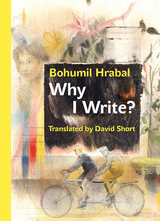
Why I Write?
The Early Prose from 1945 to 1952
Bohumil Hrabal
Karolinum Press, 2019
“Glimmers in anticipation of Hrabal’s later virtuosity.”
—New Yorker
“A collection of formative fiction from a writer whose work has earned comparison with Joyce and Beckett. . . . Early work from a writer who merits a larger readership.”
—Kirkus Reviews
This collection of the earliest prose by one of literature’s greatest stylists captures, as scholar Arnault Maréchal put it, “the moment when Hrabal discovered the magic of writing.” Taken from the period when Bohumil Hrabal shifted his focus from poetry to prose, these stories—many written in school notebooks, typed and read aloud to friends, or published in samizdat—often showcase raw experiments in style that would define his later works. Others intriguingly utilize forms the author would never pursue again. Featuring the first appearance of key figures from Hrabal’s later writings, such as his real-life Uncle Pepin, who would become a character in his later fiction and is credited here as a coauthor of one piece, the book also contains stories that Hrabal would go on to cannibalize for some of his most famous novels. All together, Why I Write? offers readers the chance to explore this important nascent phase of Hrabal’s writing.
Expertly interpreted by award-winning Hrabal translator David Short, this collection comprises some of the last remaining prose works by Hrabal to be translated into English. A treasure trove for Hrabal devotees, Why I Write? allows us to see clearly why this great prose master was, as described by Czech writer and publisher Josef Škvorecký, “fundamentally a lyrical poet.”
—New Yorker
“A collection of formative fiction from a writer whose work has earned comparison with Joyce and Beckett. . . . Early work from a writer who merits a larger readership.”
—Kirkus Reviews
This collection of the earliest prose by one of literature’s greatest stylists captures, as scholar Arnault Maréchal put it, “the moment when Hrabal discovered the magic of writing.” Taken from the period when Bohumil Hrabal shifted his focus from poetry to prose, these stories—many written in school notebooks, typed and read aloud to friends, or published in samizdat—often showcase raw experiments in style that would define his later works. Others intriguingly utilize forms the author would never pursue again. Featuring the first appearance of key figures from Hrabal’s later writings, such as his real-life Uncle Pepin, who would become a character in his later fiction and is credited here as a coauthor of one piece, the book also contains stories that Hrabal would go on to cannibalize for some of his most famous novels. All together, Why I Write? offers readers the chance to explore this important nascent phase of Hrabal’s writing.
Expertly interpreted by award-winning Hrabal translator David Short, this collection comprises some of the last remaining prose works by Hrabal to be translated into English. A treasure trove for Hrabal devotees, Why I Write? allows us to see clearly why this great prose master was, as described by Czech writer and publisher Josef Škvorecký, “fundamentally a lyrical poet.”
[more]
READERS
Browse our collection.
PUBLISHERS
See BiblioVault's publisher services.
STUDENT SERVICES
Files for college accessibility offices.
UChicago Accessibility Resources
home | accessibility | search | about | contact us
BiblioVault ® 2001 - 2024
The University of Chicago Press









